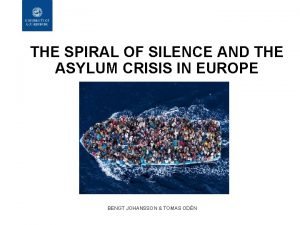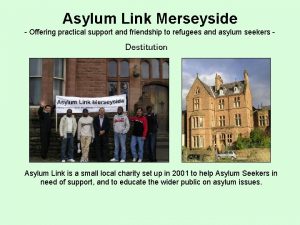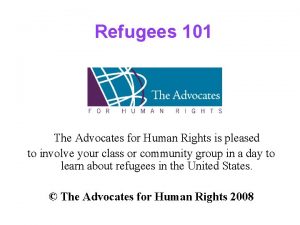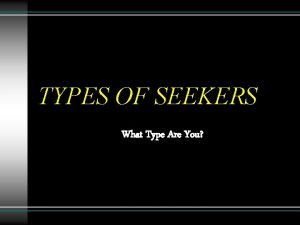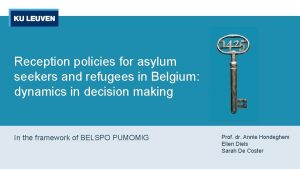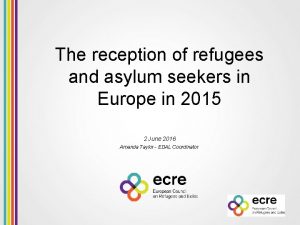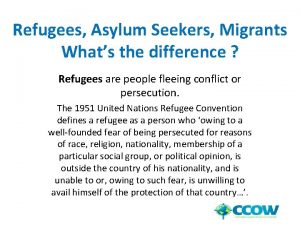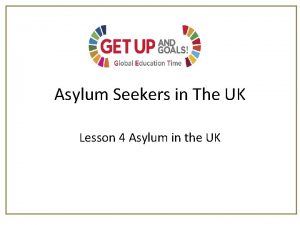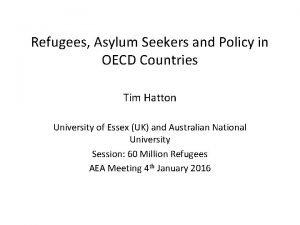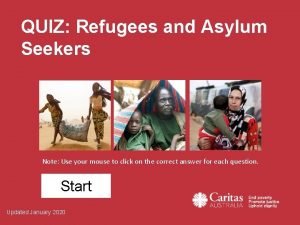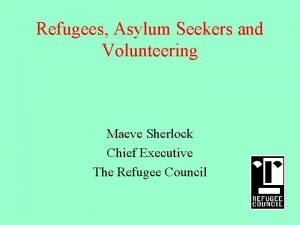The reception of refugees and asylum seekers in















- Slides: 15

The reception of refugees and asylum seekers in Europe in 2015 2 June 2016 Amanda Taylor - EDAL Coordinator

Snapshot of numbers Table 1: Number of new asylum applicants GEO/TIME 2008 2009 2010 2011 2012 2013 2014 2015 European Union (28 countries) 152, 890 195, 840 206, 880 263, 160 278, 280 372, 855 562, 680 1, 255, 685 Table 2: Number of new female asylum applicants GEO/TIME 2008 2009 2010 2011 2012 2013 2014 2015 European Union (28 countries) 45, 605 68, 745 75, 530 83, 340 96, 125 120, 975 164, 155 343, 830 Table 3: Unaccompanied asylum seeking children in selected AIDA countries: 2015 07/10/2020

Outline • Reception definition: Conceptual uncertainty • Reception in practice: Emergency-driven mind set • Reception provision for vulnerable persons: Shortcomings hit the vulnerable first

Reception definition • Main instrument outlining Member States obligations for reception (Reception Conditions Directive (Directive 2013/33/EU) contains no definition of the term. • “Reception conditions” – Art 2(f) “full set of measures that Member States grant to applicants in accordance with this Directive” • “Material reception conditions” – Art 2(g) “means the reception conditions that include housing, food and clothing provided in kind, or as financial allowances or in vouchers, or a combination of the three, and a daily expenses allowance” • + Article 17 (2) ALL material reception conditions (i. e. housing or financial vouchers) need to “provide an adequate standard of living for applicants, which guarantees their subsistence and protects their physical and mental health. Member States shall ensure that standard of living is met in the specific situation of vulnerable persons. ” • ONLY exception to this is where assessment of specific needs of applicant is required or housing capacity is temporarily exhausted. NONETHELESS must still ensure basic needs.

Other definitional guidance Reception Conditions Directive can’t be read in a vacuum! - Charter of Fundamental Rights – Article 1 right to human dignity and Article 35 right to health care - European Convention on Human Rights – Article 3 prohibition against inhumane treatment - European Social Charter – Article 16 provision of family housing - International Covenant of Economic Social and Cultural Rights – Article 11 right of everyone to an adequate standard of living for himself and his family, including adequate food, clothing and housing, and to the continuous improvement of living conditions. 07/10/2020

+ Case law! - Court of Justice of the European Union: “Asylum seekers may not be deprived, even for a temporary period of time, of the protection of the minimum standards laid down by the RCD” - “If financial assistance is provided the amount must be sufficient to ensure a dignified standard of living and adequate for the health of applicants and capable of ensuring their subsistence. ” 07/10/2020

Reception definition for vulnerable persons • No definition of Vulnerable Persons in RCD BUT non-exhaustive list of groups that MS must take into account when implementing Directive: Art 21 “minors, unaccompanied minors, disabled people, elderly people, pregnant women, single parents with minor children, victims of human trafficking, persons with serious illnesses, persons with mental disorders and persons who have been subjected to torture, rape or other serious forms of psychological, physical or sexual violence, such as victims of female genital mutilation” Reception conditions? Standard of living (adequate) met for vulnerable persons. Gender and age-specific concerns and the situation of vulnerable persons taken into consideration in relation to applicants within the premises and accommodation centres 07/10/2020

Reception conditions? • • • Art 17(2) Standard of living (adequate) met for vulnerable persons. Art 18(3) Gender and age-specific concerns and the situation of vulnerable persons taken into consideration in relation to applicants within the premises and accommodation centres. Art 18(4) MS must prevent assault and gender-based violence, including sexual assault and harassment, within the premises and accommodation centres Art 19(2) MS shall provide necessary medical or other assistance to applicants who have special reception needs, including appropriate mental health care where needed. Art 25(1)-(2) Member States shall ensure that persons who have been subjected to torture, rape or other serious acts of violence receive the necessary treatment for the damage caused by such acts, in particular access to appropriate medical and psychological treatment or care. Those working with victims of torture, rape or other serious acts of violence shall have had and shall continue to receive appropriate training concerning their needs. • All of the above hinges on assessment of vulnerability!! 07/10/2020

Reception in practice • States (wilfully) lack the ability to receive those seeking refuge in appropriate, dignified conditions as mandated by their protection obligations. • Proliferation of detention – blurring of lines between reception and detention; a symptom of the “hotspots” Pozzallo hotspot, Italy 07/10/2020 Moria hotspot, Lesvos, Greece

Detention under EU law • Applicants can be detained when it proves necessary and on the basis of an individualised assessment of each case and if less coercive alternative measures cannot be applied effectively. • An applicants vulnerability may bring into question the proportionality of detaining an individual applicant. • The health including the mental health of applicants in detention who are vulnerable persons shall be of primary concern to national authorities. • Shall ensure regular monitoring. • Minors shall be detained only as a measure of last resort and after having been established that less coercive alternative measures cannot be applied effectively. • Unaccompanied minors – only detained in exceptional circumstances and never in prison accommodation. 07/10/2020

• Conditions are well below the prescribed legislative standards Emergency accommodation – Germany Transit centre German-Austrian border 07/10/2020

• Abandonment of any qualitative assessment Post-Idomeni, Greece 07/10/2020

Reception for vulnerable persons • Identification and assessment of vulnerability is the axis upon which adequate and tailored reception facilities depend upon. • Majority of AIDA countries do not provide for a procedure to identify or assess vulnerability. • Where there is legislation assessment is done on obvious elements to vulnerability = limits definition attributed to VP in RCD. • No further details of identifying vulnerability later on. • Proliferation of detention means that avenues to identify vulnerability are extremely limited. • Use of accelerated or border procedures are ill-suited for vulnerable persons • Lack of foresight in resources means deficiencies in provision of substantive care, ie health care 07/10/2020

Result? Vulnerable persons are being placed in highly unsuitable conditions 07/10/2020

Conclusion • Substandard living conditions and destitution risk becoming an integral part of seeking asylum in Europe. • Reliance on temporary accommodation but the continued and broad use of these temporary forms of reception seems to question their exceptionality in practice. • European states and EU institutions have too readily presumed deprivation of liberty as an acceptable measure for the accommodation of refugees and migrants. • Unstable nature of reception in Europe has borne heavily down on the ability of states to assess special reception and procedural needs, to the point that identification of vulnerability has ultimately been omitted by a significant number of countries. • Heavily curtailed provision of tailored services has led to a trivialisation of vulnerability and the normalisation of highly unsuitable environments for vulnerable persons. 07/10/2020
 Paul mange johansen
Paul mange johansen The asylum
The asylum Asylum link merseyside
Asylum link merseyside Opinio juris
Opinio juris Bethpage asylum office
Bethpage asylum office Refugees brian bilston lesson
Refugees brian bilston lesson Laws of migration ap human geography
Laws of migration ap human geography Capoeira 4 refugees
Capoeira 4 refugees Refugees
Refugees Capoeira songbook
Capoeira songbook Types of seekers
Types of seekers Designing and managing integrated marketing channels
Designing and managing integrated marketing channels Seekers of yahweh ministries
Seekers of yahweh ministries Great bear lake erin hunter
Great bear lake erin hunter Treatise for the seekers of guidance
Treatise for the seekers of guidance Seeker's quorum chest
Seeker's quorum chest

